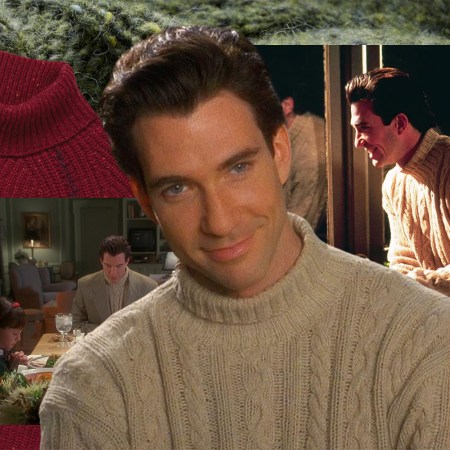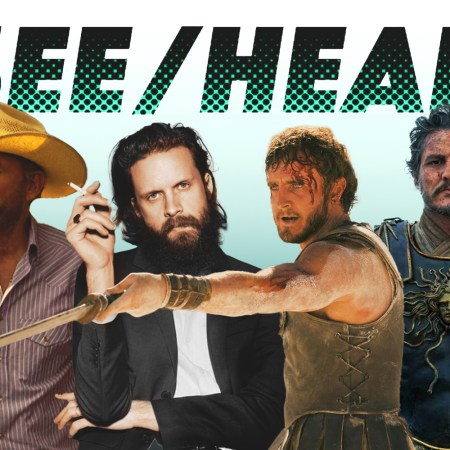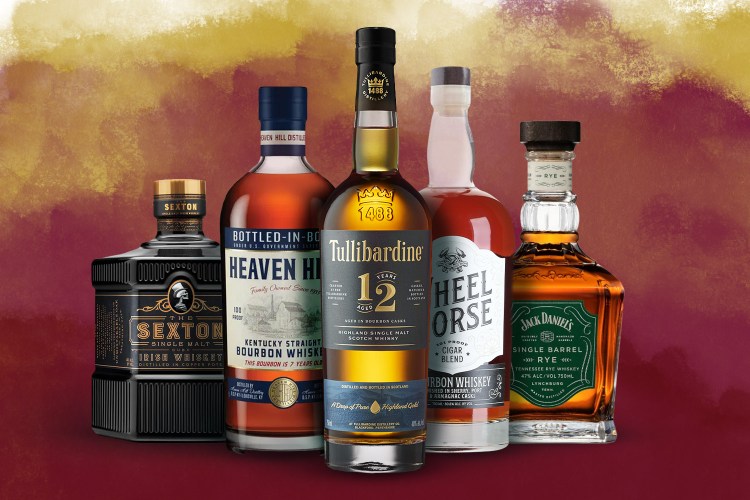While holiday movies vary wildly in terms of genre, tone and quality, they almost invariably share one trait: a climactic scene that exists solely to elucidate the season’s “true meaning” (family, unity, compassion, etc.).
But look past the clichés, and you’ll find there’s usually something a little more interesting hiding in the margins.
Hence, our list of the hidden meaning of 10 iconic holiday movies.
You thought the Whos had pure intentions? That Kevin McAllister deserved salvation? That Arnold’s “Turbo Man” was the good guy?
Think again, fellow revelers.
It’s a Wonderful Life (1946)
Distraught small-town banker George Bailey plans to end his life on Christmas Eve, until an angel shows him what the world would be like if he’d never been born.
What you think the message is: “No man is a failure who has friends.” Clarence the Angel’s final message to George, after the town rallies to help him replace the $8,000 Uncle Billy handed to Mr. Potter. The movie ends with a rendition of “Auld Lang Syne” that has never known a dry eye.
What the message really is: “It’s OK to save a little for yourself once in a while. Or move.” George always does the selfless thing. His brother Harry piles up a Forrest Gumpian list of accomplishments (All-American football player, Medal of Honor recipient) while George stays home and manages their dad’s flimsy business. He uses his honeymoon cash to bail out the whole town during the Depression. He inexplicably keeps dopey Uncle Billy on staff. All these personal deposits of selflessness result in a massive helping hand when he needs its most, but what if the town didn’t drum up the funds? Prison for George, that’s what. The Baileys should’ve made their own luck by leaving this rapacious town behind.
Elf (2003)
Upon discovering he’s actually a human being, 6’3” Buddy the Elf travels through candy cane forests and the Lincoln Tunnel to meet his biological father and dance in shiny mail rooms.
What you think the message is: “The best way to spread Christmas cheer is singing loud for all to hear.” Buddy coaxes a smile or song out of almost everyone he meets, including his half-brother, new girlfriend and irritable dad.
What the message really is: “If it takes a syrup-dependant man-child who grew up on the North Pole to bring your family together, you’re probably an asshole.” Walter Hobbs is an executive at a children’s publishing company. Why does he need to answer emails during family dinner? His son is a good kid, his wife is wonderful (she partakes in Buddy’s syrup spaghetti without a second glance) … so what’s going on here? Be grateful for your family; in real life, a Christmas miracle will not come along to bail you out.
How the Grinch Stole Christmas (1966)
A deranged outcast dresses up as Santa Claus in order to pillage every single home in a small village on Christmas Eve.
What you think the message is: “‘Maybe Christmas,’ [the Grinch] thought, ‘doesn’t come from a store. Maybe Christmas … perhaps … means a little bit more!’” Even without all their conspicuous consumption, the Whos still love Christmas. Realizing this, the Grinch sees the error in his ways and returns all their things, thereby ingratiating himself to the community.
What the message really is: “Keep your friends close, but your enemies closer.” If these Whos are so kind-hearted, why did it take until the calamitous night in question for them to welcome the Grinch into their embrace? And why did he live in a cave on a mountain in the first place? Could it be that they went out of their way to ridicule and ostracize this distinctly different (he’s green, after all) personage for decades, only deciding to make amends when he proved himself a cunning and dangerous adversary? It’s easy to envision a sequel that mirrors the plot of Get Out, with the Grinch filling in as the unsuspecting outsider lulled into a false sense of security by townspeople with sinister motives.
A Christmas Carol (1951)
Tiny Tim. Spirits of Christmas past, present and yet to come. Scrooge. You know the drill, no matter what billionth adaptation/remake/reimagining of the Dickens novella (which brought us “humbug” and popularized the phrase “Merry Christmas!”). The 1951 British version is considered the standard, but they obviously all follow the same Christmas roadmap.
What you think the message is: “A Merry Christmas to us all; God bless us, every one!” The selfless spirit of Tiny Tim, in part, can melt even the coldest heart during the holidays — with a little tough love from the ghosts of self-reflection.
What the message really is: Greed is rewarded with second chances? Scrooge lives the later years of his life oblivious to the misery he causes — and is (materialistically) rewarded for it. Then, through the might of powerful spirits (who choose him, of all people, to visit), he’s given a loophole to atone for his atrocious behavior. Oh, you sent a big turkey over and gave everyone a raise? Congrats on buying your way into the good place.
Silent Night Deadly Night (1984)
Billy Chapman, traumatized by both the childhood murder of his parents to a man in a Santa outfit and a draconian nun, embarks upon a holiday killing spree.
What you think the message is: You probably didn’t think this cult classic had a message, but if it did, it’d be along the lines of “Dysfunctional families breed children who engage in typical ‘80s slasher-film tropes (see: impaled teenage couple about to have sex).”
What the message really is: The holidays are hell, and the season’s “joy” is forced upon on us until we break. Billy endures a sick grandfather, the death of his parents and a torturous upbringing in an orphanage, all set to the soundtrack of yuletide cheer. He snaps. It’s not that much different than Sally’s dismissal of the season to Harry as the harbinger for “a lot of suicides.”
Jingle All the Way (1996)
Howard Langston is a suburban dad who puts work ahead of family and then tries to make it up to them by buying his son Jamie the hottest toy of the year: a Turbo Man action figure.
What you think the message is: When Arnold Schwarzenegger as Langston finally gives Jamie the toy he’s gone through hell and skin-tight rubber for, his son says, “I don’t need the doll. I’ve got the real Turbo Man at home!” Meaning? All he (and his mom) really wanted was to spend quality time with dad. Family is more important than any present.
What the message really is: “Divorce can be a wound that flares up around the holidays, and your yuletide cheer should include allowances for those who have suffered it.” Sinbad’s mailman antagonist Myron mentions alimony payments and at the end gets carted off to the police station in pursuit of the same Turbo Man toy. The lecherous playboy neighbor Ted, meanwhile, is also divorced. While they both drive Howard to the brink of ruin, they’re the ones who needed a Christmas miracle, not the semi-inconvenienced Langstons.
Eyes Wide Shut (1999)
It’s Christmastime for Dr. Bill Harford’s high-society circles in NYC. But a revelation that his wife considered an affair leads him on an all-night escapade through prostitutes’ apartments, jazz clubs, costume shops, morgues and a secret society’s masquerade orgy.
What you think the message is: Stanley Kubrick’s final film is notoriously opaque, but when Harford (Tom Cruise) and his wife (Nicole Kidman) come out together in the end, it would seem the message is: “Talking through sexual desires and grievances with your partner is always healthier than hiding them.”
What the message really is: “If you help hide someone else’s amoral secrets, prepare to be implicated in them and thrown under the bus.” At the beginning of the film Harford seems like a standup guy: he revives a prostitute who has overdosed on a speedball at a Christmas party after finding her naked in the company of the host. Yes, he saves a life, but he also keeps his host’s depraved skeleton in the closet. Later, when the host’s full-blown sexual deviancy comes to light, Harford is threatened rather than thanked, and is always kept at arm’s length by the wealthy patrons who see him as a tool to wield or discard.
Friday After Next (2002)
Craig and Day Day are robbed of their Xmas presents and rent money and must survive new jobs and a curmudgeonly landlord to avoid eviction.
What you think the message is: “With strong community support and a little holiday cheer, good people can overcome the hardships that come their way.” Craig and Day Day recruit the help of family and friends to throw a rent party, outfox their landlord and catch the burglar.
What the message really is: “Justice is usually a function of one’s own doing, as law enforcement officers are generally apathetic to inner-city crime.” Craig and Day Day’s attempts to consort with local law enforcement are cast aside as a nuisance: rather than protection and service, they receive threats of comeuppance.
Gremlins (1984)
A struggling inventor surreptitiously acquires an exotic “Mogwai” from a Chinatown antique shop run by the aging Mr. Wing as a Christmas pet for his son, only vaguely heeding important rules regarding the creature’s light exposure, feeding and aversion to water. These rules are summarily broken, causing the Mogwai (named “Gizmo” by Billy) to multiply and ultimately transform into a pack of demented reptilian monsters intent on destruction.
What you think the message is: Despite seeming like a no-brainer Christmas present, pets are a major responsibility not to be taken lightly. Instructions exist for a reason.
What the message really is: Western civilization’s colonial proclivities and hubristic desire to co-opt/commodify cultural property that it does not, cannot, and has no true desire to fully comprehend is a short path to chaos … however, those who seek a deeper understanding and connection can be agents of fruitful change and collaboration. See: Mr. Wing arriving in the wake of the gremlin attack to take back Gizmo and chide the Peltzer family for their carelessness, before granting that perhaps Billy, who has bonded with the Mogwai, might one day be ready to care for him properly.
Home Alone (1990)
After sleeping through a flight to Paris, eight-year-old Kevin McAllister is forced to spend the holidays alone … save for a pair of maladroit thugs aiming to ransack his family’s house.
What you think the message is: “The most important thing about the holidays is spending them with your family.” As evidenced by A) Kevin’s mother’s Odyssean journey home and B) his burgeoning friendship with a miserly neighbor.
What the message really is: “The greatest gift you can give your child is a lesson in personal safety.” What is a child but a wildly imaginative tiny idiot that cannot grapple with the consequences of its actions? While McAllister’s bandit-thwarting hijinks are fun in theory, consider what would happen if not for the timely intervention of that miserly neighbor. Remember to teach your kids the basics — Stranger Danger, look both ways before crossing the road, how to dial 9-1-1 — ahead of what is sure to be a busy and action-packed season.
Additional reporting by Kirk Miller, Tanner Garrity, Alex Lauer, Eli London and Danny Agnew
This article was featured in the InsideHook newsletter. Sign up now.























